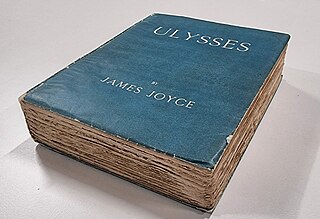
Ulysses is a modernist novel by Irish writer James Joyce. It was first serialized in parts in the American journal The Little Review from March 1918 to December 1920 and then published in its entirety in Paris by Sylvia Beach on 2 February 1922, Joyce's 40th birthday. It is considered one of the most important works of modernist literature and has been called "a demonstration and summation of the entire movement." According to Declan Kiberd, "Before Joyce, no writer of fiction had so foregrounded the process of thinking".
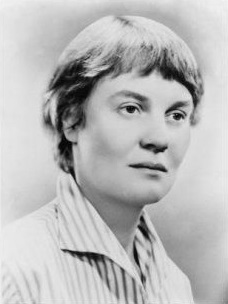
Dame Jean Iris Murdoch was an Irish and British novelist and philosopher. Murdoch is best known for her novels about good and evil, sexual relationships, morality, and the power of the unconscious. Her first published novel, Under the Net (1954), was selected in 1998 as one of Modern Library's 100 best English-language novels of the 20th century. Her 1978 novel The Sea, the Sea won the Booker Prize. In 1987, she was made a Dame by Queen Elizabeth II for services to literature. In 2008, The Times ranked Murdoch twelfth on a list of "The 50 greatest British writers since 1945".
John Oliver Bayley, CBE, FBA, FRSL was a British academic, literary critic and writer. He was the Warton Professor of English at the University of Oxford from 1974 to 1992. His first marriage was to the novelist and philosopher Iris Murdoch.
In literary criticism, stream of consciousness is a narrative mode or method that attempts "to depict the multitudinous thoughts and feelings which pass through the mind" of a narrator. The term was coined by Daniel Oliver in 1840 in First Lines of Physiology: Designed for the Use of Students of Medicine, when he wrote,

Mrs Dalloway is a novel by Virginia Woolf that details a day in the life of Clarissa Dalloway, a fictional high-society woman in post–First World War England. It is one of Woolf's best-known novels.
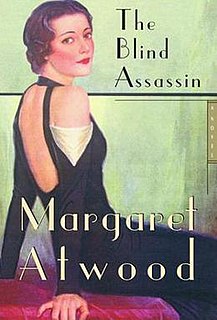
The Blind Assassin is a novel by the Canadian writer Margaret Atwood. It was first published by McClelland and Stewart in 2000. The book is set in the fictional Ontario town of Port Ticonderoga and in Toronto. It is narrated from the present day, referring to previous events that span the twentieth century but mostly the 1930s and 1940s. It is a work of historical fiction with the major events of Canadian history forming an important backdrop, for example, the On-to-Ottawa Trek and a 1934 Communist rally at Maple Leaf Gardens. Greater verisimilitude is given by a series of newspaper articles commenting on events and on the novel's characters from a distance.

The Sea, the Sea is a novel by Iris Murdoch. Published in 1978, it was her nineteenth novel. It won the 1978 Booker Prize.

The Red and the Green is a novel by Iris Murdoch. Published in 1965, it was her ninth novel. It is set in Dublin during the week leading up to the Easter Rising of 1916, and is her only historical novel. Its characters are members of a complexly inter-related Anglo-Irish family who differ in their religious affiliations and in their views on the relations between England and Ireland.

Thálatta! Thálatta! was the shouting of joy when the roaming Ten Thousand Greeks saw Euxeinos Pontos from Mount Theches (Θήχης) in Trebizond, after participating in Cyrus the Younger's failed march against the Persian Empire in the year 401 BC. The mountain was only a five-day march away from the friendly coastal city Trapezus. The story is told by Xenophon in his Anabasis.
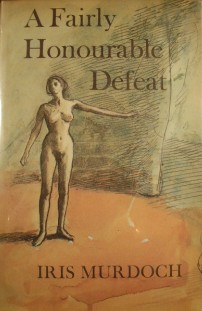
A Fairly Honourable Defeat is a novel by the British writer and philosopher Iris Murdoch. Published in 1970, it was her thirteenth novel.

The Lady Vanishes is a 1938 British mystery thriller film directed by Alfred Hitchcock, starring Margaret Lockwood and Michael Redgrave. Written by Sidney Gilliat and Frank Launder, based on the 1936 novel The Wheel Spins by Ethel Lina White, the film is about a beautiful English tourist travelling by train in continental Europe who discovers that her elderly travelling companion seems to have disappeared from the train. After her fellow passengers deny ever having seen the elderly lady, the young woman is helped by a young musicologist, the two proceeding to search the train for clues to the old lady's disappearance.
Georg Kreisel FRS was an Austrian-born mathematical logician who studied and worked in the United Kingdom and America.

The Bell is a novel by Iris Murdoch. Published in 1958, it was her fourth novel. It is set in a lay religious community situated next to an enclosed community of Benedictine nuns in Gloucestershire.
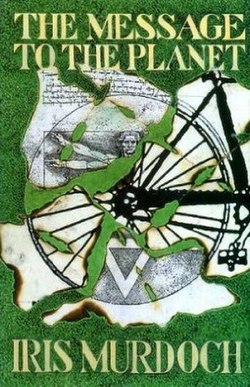
The Message to the Planet is a novel by Iris Murdoch. Published in 1989, it was her twenty-fourth novel.

The Nice and the Good is a novel by Iris Murdoch. Published in 1968, it was her eleventh novel. The Nice and the Good was shortlisted for the 1969 Booker Prize.
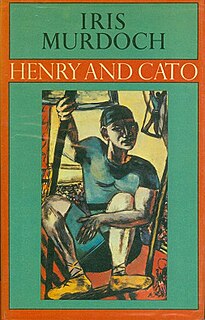
Henry and Cato is a novel by Iris Murdoch. Published in 1976, it was her eighteenth novel.

An Accidental Man is a novel by Iris Murdoch, which was published in 1971. It was her fourteenth novel.

The Time of the Angels is a philosophical novel by British novelist Iris Murdoch. First published in 1966, it was her tenth novel. The novel centres on Carel Fisher, an eccentric Anglican priest who is the rector of a London church which was destroyed by bombing during World War II. Fisher denies the existence of God and the possibility of human goodness in a post-theistic world. The novel, which has elements of Gothic fiction, received mixed reviews on its publication.
The Guardian's 100 best novels is a list of the best English-language novels as selected by Robert McCrum for The Guardian.















